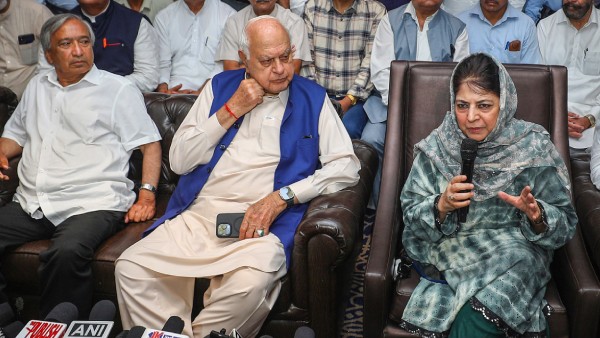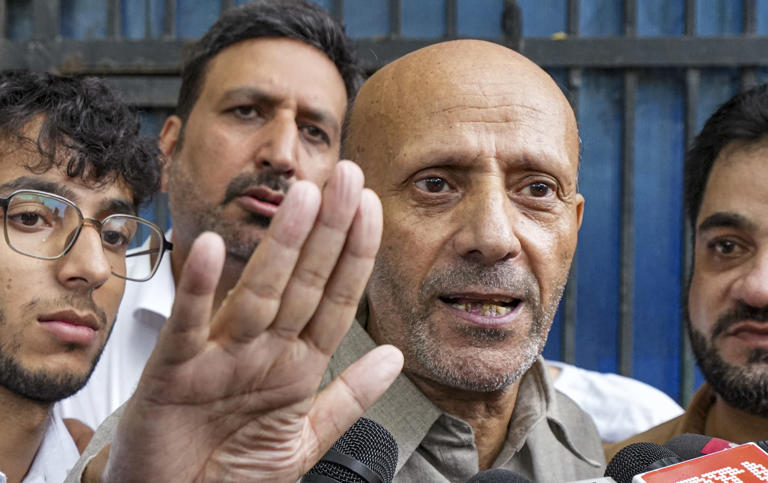Statehood for Jammu and Kashmir: NC, PDP, and Congress Unite Over Delay
By: Javid Amin | Srinagar | 08 Aug 2025
A Region Still Waiting for Its Political Rights
Six years after the abrogation of Article 370 and the bifurcation of Jammu and Kashmir into two Union Territories, the region’s political leadership remains united on one key demand: immediate restoration of full statehood.
At a recent INDIA bloc opposition gathering in Delhi, senior leaders from the National Conference (NC), Congress, and Peoples Democratic Party (PDP) openly voiced frustration over the Centre’s prolonged inaction.
Despite the return of an elected government in 2024, J&K’s Rajya Sabha seats remain vacant and its constitutional powers curtailed — creating what leaders call a “democratic deficit” that undermines India’s federal structure.
Farooq Abdullah’s Stand: Linking Statehood to Representation
At the meeting hosted by Rahul Gandhi on August 7, NC President Dr. Farooq Abdullah made two clear demands:
-
Restore full statehood without delay.
-
Conduct Rajya Sabha elections to fill all four seats vacant since February 2021.
He emphasised that the Supreme Court hearing scheduled for August 8 on the statehood plea offers a crucial opportunity. The NC has consistently pressed the Centre to table a Statehood Restoration Bill in the ongoing Parliament session.
In a political jab, Abdullah also criticised the 2015 PDP-BJP coalition, blaming it for setting off a series of political crises that ultimately led to the loss of J&K’s autonomy.
Mehbooba Mufti and PDP: “Statehood Cannot Be a Bargaining Chip”
PDP President Mehbooba Mufti has been equally vocal about the statehood delay, framing it as an issue of dignity, not political negotiation.
Her key points:
-
Statehood restoration must be unconditional — not tied to security assessments or electoral timing.
-
Rajya Sabha vacancies leave J&K without a voice in one of India’s most important legislative forums.
-
The 2019 changes, she says, eroded trust between Delhi and J&K’s people. Restoring statehood is the minimum first step toward rebuilding it.
Mehbooba has also warned against symbolic gestures:
“Don’t offer a facade of democracy while withholding the essence of it. Without statehood, elections are just window dressing.”
While critics still hold her responsible for partnering with the BJP in 2015, she counters that the post-2018 unilateral decisions by the Centre are the real cause of J&K’s current democratic vacuum.
Congress’s Sharp Critique on Article 370 Anniversary
Marking August 5 — the sixth anniversary of Article 370’s abrogation — Congress leaders sharpened their criticism:
-
Pawan Bansal accused the government of valuing “control over democratic empowerment.”
-
Imran Masood described UT status as “military control in civilian clothes.”
-
The party’s stance: Without statehood, J&K’s democracy is structurally incomplete.
Rajya Sabha Puzzle: Four Seats Vacant for Over Four Years
The prolonged vacancy of J&K’s four Rajya Sabha seats since February 2021 has become another flashpoint.
Farooq Abdullah called it “unconstitutional and unacceptable”, pointing out that Assembly elections took place nearly a year ago, yet the Election Commission of India (ECI) has failed to announce the polls.
Manish Tewari’s Legal Perspective
Congress MP Manish Tewari added constitutional depth:
-
Highlighted the anomaly of all RS members retiring simultaneously due to extended President’s Rule.
-
Suggested a Presidential reference to reconcile Article 83 of the Constitution with Section 154(1) of the Representation of the People Act, 1951.
Political and Legal Crossroads
Supreme Court Hearing
The Supreme Court’s August 8 hearing on statehood could provide judicial clarity, though political will from the Centre remains essential.
Centre’s Hesitation
Analysts suggest that the government’s reluctance stems from:
-
Security considerations in the Valley.
-
The BJP’s ideological stance on the 2019 changes.
-
Desire to maintain central administrative control ahead of national elections.
INDIA Bloc Unity
In a rare show of alignment, NC, PDP, and Congress leaders are jointly framing statehood restoration and Rajya Sabha polls as non-negotiable democratic rights, not partisan demands.
Broader Implications: Testing India’s Federalism
The situation in J&K raises nationwide concerns:
-
How long can a region be kept in UT status against the will of its elected representatives?
-
Does denying RS representation to a state or UT violate the spirit of the Constitution?
-
Could such precedents weaken other states’ protections in the future?
What’s Next?
The opposition’s immediate priorities:
-
Push for a clear, time-bound roadmap for full statehood.
-
Demand immediate Rajya Sabha elections for J&K.
-
Resist half-measures such as partial autonomy or selective statehood for one province.
If the Centre does not respond, the issue could dominate both Parliament’s winter session and state-level campaigns in 2026.
Bottom-Line: A Growing Political Consensus in J&K
For once, J&K’s major parties — often bitter rivals — are aligned on a core demand. NC, PDP, and Congress may differ on how they got here, but they now agree on what’s next:
-
Restore full statehood for Jammu and Kashmir.
-
Hold Rajya Sabha elections without further delay.
Whether the Centre views this as an opportunity for reconciliation or another political standoff will shape the region’s democratic future.
As Mehbooba Mufti summed it up:
“Representation is the soul of democracy. Without it, we’re not a part of the system — we’re just subjects of it.”



